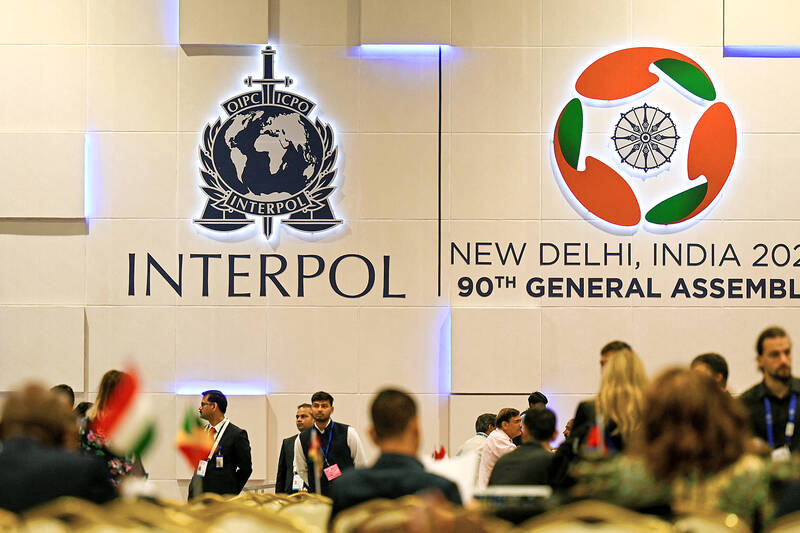Taiwan’s efforts to participate in Interpol have gained wider international support, despite not receiving an invitation to attend its annual meeting this year, the Ministry of Foreign Affairs said on Saturday.
The 90th Interpol general assembly was held from Tuesday to Friday in New Delhi, including chiefs of police and senior officials from its 195 member countries to discuss global policing issues.
More than 1,375 executive agencies, parliaments, international parliamentary groups and senior politicians from 50 countries at the assembly voiced support for Taiwan’s meaningful participation, the ministry said.

Photo: AFP
They included 10 of Taiwan’s 14 diplomatic allies, which wrote letters, issued statements and made social media posts to voice their support, it said.
Allies said that Taiwan’s admission to Interpol could help global efforts to prosecute cross-border crime, and address threats and challenges faced by the world, it said.
British Minister of State for Asia, Energy, Climate and Environment Amanda Milling and Dutch Minister of Foreign Affairs Wopke Hoekstra also advocated for Taiwan’s Interpol participation, the ministry said.
The US, Japanese and Australian missions in Taiwan additionally expressed support on their Facebook pages, or shared short films made by Taiwan that lobby for international support for its participation in Interpol.
Parliaments in the Marshall Islands and Czech Republic, along with 16 US state congresses and the US Council of State Governments’ Eastern Regional Conference, approved resolutions to support Taiwan’s participation in Interpol, MOFA said.
US representatives John Curtis and Gerald Connolly, who is co-chair of the US Congressional Taiwan Caucus, wrote a joint letter urging the US executive branch to help Taiwan join Interpol, while lawmakers from Canada and South Korea also voiced their support, it added.
The ministry said that Taiwan is deeply encouraged by and grateful for all of the support, and for the international recognition of Taipei’s potential to contribute to the organization.
Taiwan joined Interpol in 1961, but was forced to withdraw in 1984 after the organization switched its recognition to Beijing. Its participation has been blocked since then under a resolution passed at Interpol’s 53rd General Assembly the same year.

Alain Robert, known as the "French Spider-Man," praised Alex Honnold as exceptionally well-prepared after the US climber completed a free solo ascent of Taipei 101 yesterday. Robert said Honnold's ascent of the 508m-tall skyscraper in just more than one-and-a-half hours without using safety ropes or equipment was a remarkable achievement. "This is my life," he said in an interview conducted in French, adding that he liked the feeling of being "on the edge of danger." The 63-year-old Frenchman climbed Taipei 101 using ropes in December 2004, taking about four hours to reach the top. On a one-to-10 scale of difficulty, Robert said Taipei 101

A preclearance service to facilitate entry for people traveling to select airports in Japan would be available from Thursday next week to Feb. 25 at Taiwan Taoyuan International Airport, Taoyuan International Airport Corp (TIAC) said on Tuesday. The service was first made available to Taiwanese travelers throughout the winter vacation of 2024 and during the Lunar New Year holiday. In addition to flights to the Japanese cities of Hakodate, Asahikawa, Akita, Sendai, Niigata, Okayama, Takamatsu, Kumamoto and Kagoshima, the service would be available to travelers to Kobe and Oita. The service can be accessed by passengers of 15 flight routes operated by

Taiwanese and US defense groups are collaborating to introduce deployable, semi-autonomous manufacturing systems for drones and components in a boost to the nation’s supply chain resilience. Taiwan’s G-Tech Optroelectronics Corp subsidiary GTOC and the US’ Aerkomm Inc on Friday announced an agreement with fellow US-based Firestorm Lab to adopt the latter’s xCell, a technology featuring 3D printers fitted in 6.1m container units. The systems enable aerial platforms and parts to be produced in high volumes from dispersed nodes capable of rapid redeployment, to minimize the risk of enemy strikes and to meet field requirements, they said. Firestorm chief technology officer Ian Muceus said

MORE FALL: An investigation into one of Xi’s key cronies, part of a broader ‘anti-corruption’ drive, indicates that he might have a deep distrust in the military, an expert said China’s latest military purge underscores systemic risks in its shift from collective leadership to sole rule under Chinese President Xi Jinping (習近平), and could disrupt its chain of command and military capabilities, a national security official said yesterday. If decisionmaking within the Chinese Communist Party has become “irrational” under one-man rule, the Taiwan Strait and the regional situation must be approached with extreme caution, given unforeseen risks, they added. The anonymous official made the remarks as China’s Central Military Commission Vice Chairman Zhang Youxia (張又俠) and Joint Staff Department Chief of Staff Liu Zhenli (劉振立) were reportedly being investigated for suspected “serious